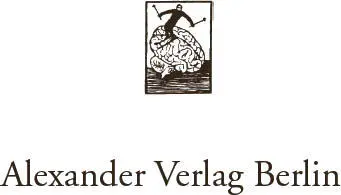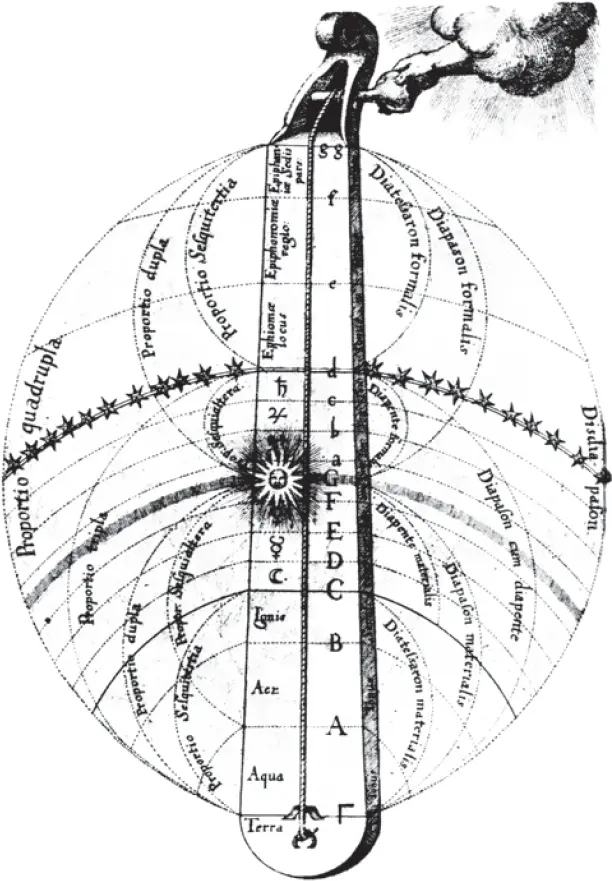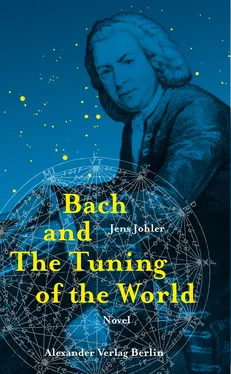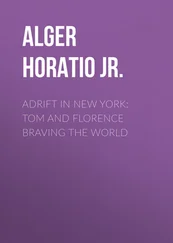Jens Johler
Marc Svetov
BACH
and
THE TUNING
OF THE WORLD
Novel
Based on an idea by
Johler & Burow


Celestial Monochord , Robert Fludd 1618
© for this edition by Alexander Verlag Berlin 2020, original copyright 2013
Alexander Wewerka, Fredericiastr. 8, 14050 Berlin, Germany
All rights reserved, in particular the right to public presentation, radio and television broadcasting as well as translation. This also applies to individual sections.
Drawings of the circles of fifths: Norbert W. Hinterberger inspired by an illustration in: Ross W. Duffin, How Equal Temperament Ruined Harmony (and Why You Should Care) , W. W. Norton & Company, New York City, 2008
Typesetting and page layout: Antje Wewerka
ISBN 978-3-89581-540-9 (eBook)
March 1722
1.Departure
2.Wicked Witchcraft
3.The Philosopher
4.Latin School
5.The Lion of Eisenach
6.The Three Musics
7.Adam Reincken
8.‘That False Serpent, Opera’
9.The Muse
10.Circe
11.‘It’s the Affections that Matter’
12.‘I Will Give my Heart to Thee’
13.Lackey
14.The Journey to F Sharp Major
15.Going South!
16.Evening Concerts
17.Angela
18.Mare Balticum
19.Dorothea Catrin
20.The New Tempering
21.‘Strange Tones’
22.The Loft
23.The Consistory
24.The Wedding
25.Curious Variations
26.The Ratswechsel Cantata
27.Weimar
28.Exult! Rejoice!
29.The Hunting Cantata
30.Black Birds
31.The Contest
32.Senesino
33.The Manuscript
34.The Loyal Subject
35.Landrichterstube
36.The Lord Chamberlain
37.Köthen
38.Handel
39.The Masterpiece
40.The Arrow
41.‘Why Did You Leave Me?’
42.Praise from the Master
43.The Well-Tempered Clavier
44.Channelled Notes
45.The Night
46.H-C-A-B
47.Father and Son
48.The St Matthew Passion
Fact and Fiction
If circumstances had brought him to a major Catholic court or into an independent civic position – and he would surely have welcomed such a development – he would without a doubt have become the greatest opera composer of his time .
Nikolaus Harnoncourt
What Newton was to natural philosophy, Sebastian Bach was to music .
Christian Friedrich Daniel Schubart
He opened his eyes and stared at the beams on the ceiling. The moon threw a pale, bluish light through the window.
He wanted to get up, get out of bed, go to his study, make a little music, play something – anything to drive away the ghosts that had haunted him in his dream; but he found he couldn’t move. His legs didn’t obey him, nor did his arms, not even a single finger.
What’s wrong with me?
He still felt pressure on his chest. Somebody had set their booted foot on it in his dream and pressed down. It felt like the boot were still pressing down; his chest was constricted; he struggled for breath.
I can’t breathe .
He listened to her breath. It was calm and even. When she exhaled, she made a soft whistling sound, a high G sharp. He wanted to wake her and ask her to help him get up; he opened his mouth to say, ‘Please help me, I can’t move, I can’t breathe,’ but no sound came. He couldn’t do a thing; not a thing. All he could do was lie there, staring at the beams on the ceiling.
Dear God, please don’t let me be paralysed .
He closed his eyes and tried to put himself back into the dream. Who was it who had put his boot on his chest? And how did it come about? He felt that something must have happened in the dream to cause his paralysis. He had a notion that he must get himself back into the dream so it would take a different course, with a different outcome.
Only to this world .
Erdmann had not said as much, but he had meant it.
Your work belongs only to this world .
He had to go back.
Images from his dream arose in him. The carriage. The street. The canal. Now he remembered the horror that had seized him when the carriage began to go under, further and further, deeper and deeper, until he was submerged in the water. But the water did not penetrate the carriage; it continued on its way, unfettered, under the surface of the water. It was as though he were sitting in the belly of a fish, like Jonah in the belly of the whale.
I went in the wrong direction , he thought, and opened his eyes. No revelation of heaven on Earth. No Jacob’s ladder reaching upwards. Only earthly music – that’s all it is. No. It’s worse than that .
The pressure on his chest increased. A dark figure suddenly stood at the foot of his bed, ramrod straight, his right hand pointing to the heavens. A prophet. A messiah. A ruler over the tuning of the world. The others surrounding him looked up to him in terror, at his fiery eyes and the arm stretched high into the heavens.
Only she didn’t look up.
Bach followed her gaze, his eyes wandering down from the prophet’s black coat to his equally black trousers and leather boots. But no … only his right foot wore a boot. Bach stared, with incredulous horror, at his left foot.
On 15 March 1700, shortly before sunrise, Bach set off.
Johann Christoph accompanied him to the town gate and, since the morning light still refused to break, part of the way beyond it. When they stopped on top of the mountain, they saw the sun sending its first rays across the edge of the forest.
‘Will you be all right on your own?’
Bach didn’t answer. Robbers and gypsies made their homes in the woodlands, waiting to grab his knapsack and violin. As soon as Johann Christoph left him, they’d pounce.
‘You’re shivering. Are you cold?’
He wasn’t cold, he was just shivering. He would immediately break into a run after his brother was gone.
‘Well, then, young ’un, God bless you.’
Bach returned his brother’s embrace and set off at a gallop.
‘Wait!’
Johann Christoph pulled a rolled-up bundle of paper from his waistcoat. ‘I almost forgot,’ he said. ‘Here, it’s yours now. Take it.’
Bach took a step back, staring at the bundle.
‘You want me to put it in your knapsack?’
While Johann Christoph untied his brother’s knapsack and stowed away the roll of paper, Bach furtively wiped a tear from the corner of his eye.
‘And work hard, always work hard, you hear?’
He nodded.
‘Why don’t you say something?’ And then, before finally setting off on his way back to Ohrdruf, Johann Christoph said in passing, more in a murmur than out loud: ‘Beware of pride, young ’un. There will come a time when you’ll surpass us all.’
Astonished, Bach watched his brother walk away. For five long years Johann Christoph had been his teacher, a strict teacher who uttered nary a word of praise for him. And now this? And what was it his brother had said? Was it a prophecy, a wish, a mission, or an order?
Just as Johann Christoph disappeared between the trees, the incandescent ball of fire rose on the horizon. Inwardly, a radiantly pure C-major chord resounded, soon dissolving into individual notes as if played on a harp. As he started on his way again, Bach whistled the arpeggio softly to himself. All of a sudden, his fear was gone. He thought of Lüneburg, of the Latin School, and of the famous Georg Böhm who played the organ there; he thought about the musical manuscript in his knapsack, and about his brother’s words. And while tears sprang once again to his eyes, he increased his pace, hurrying along so as to arrive in Gotha on time, where Georg Erdmann, his fellow pupil, was eagerly awaiting him.
Читать дальше














